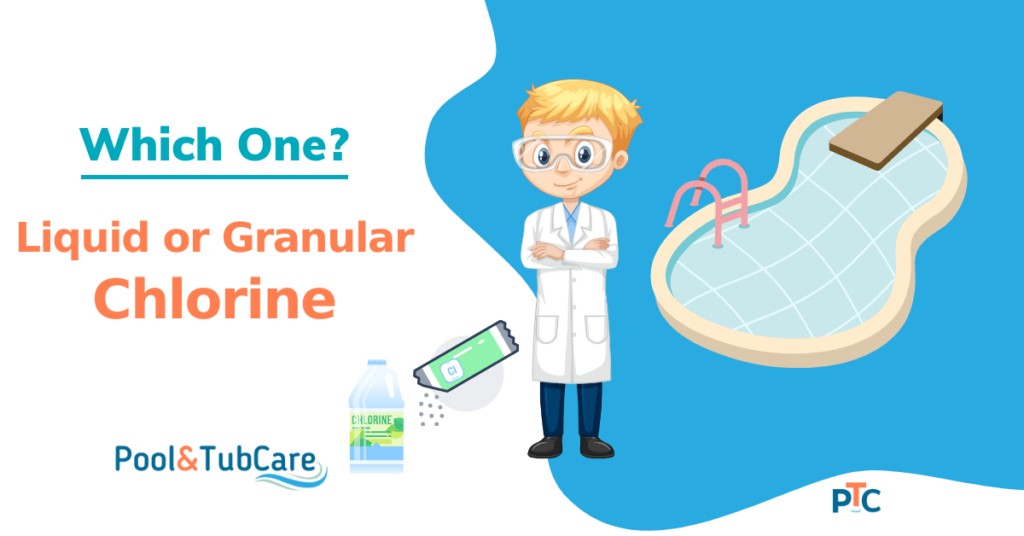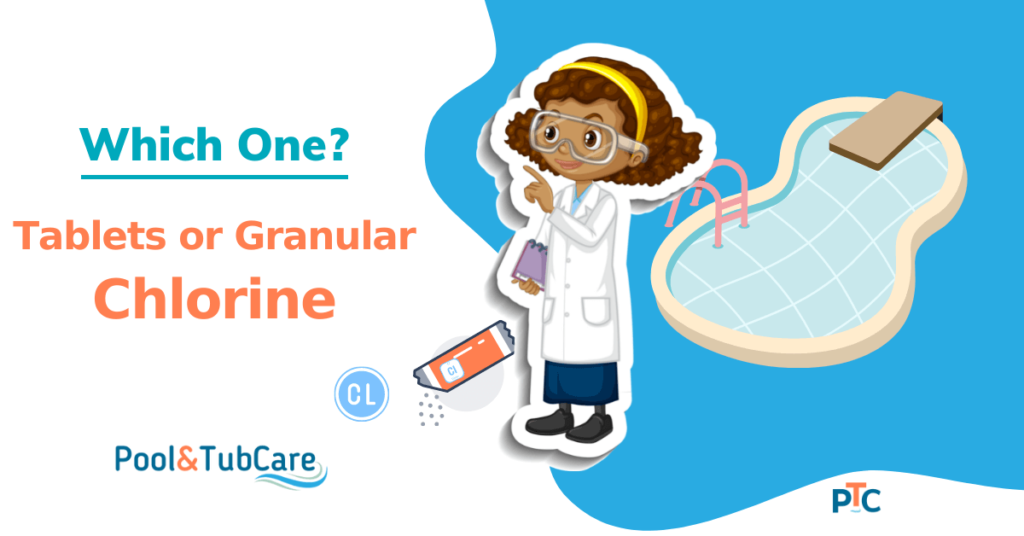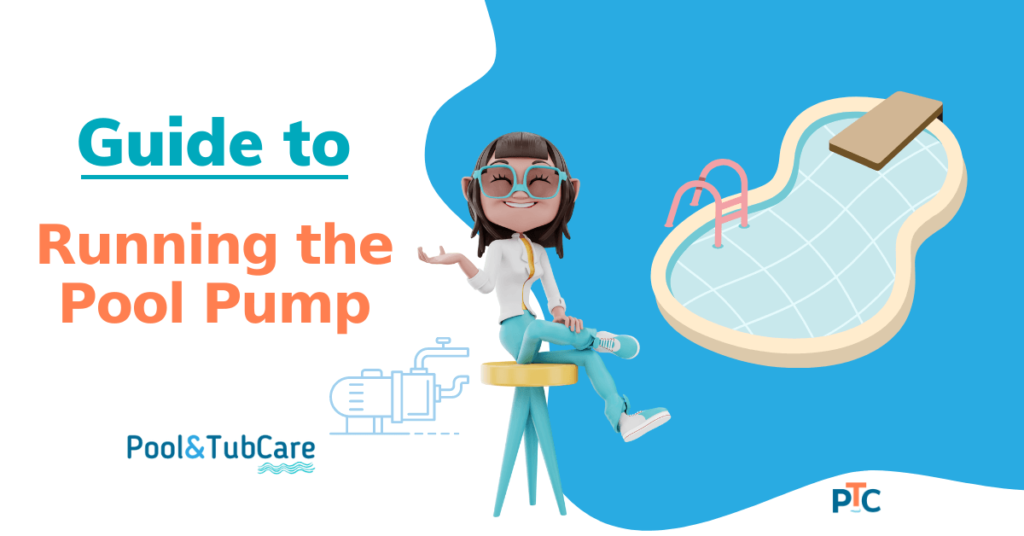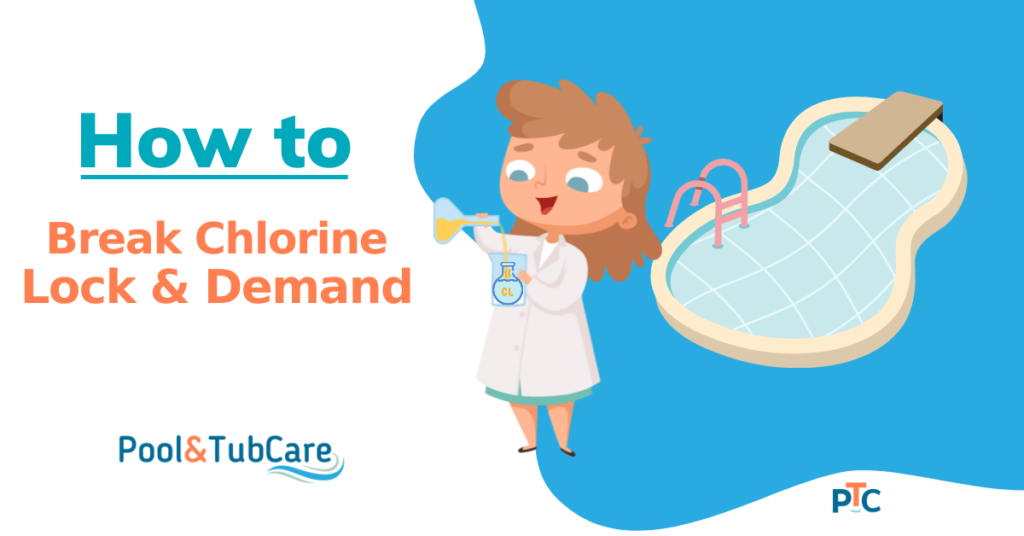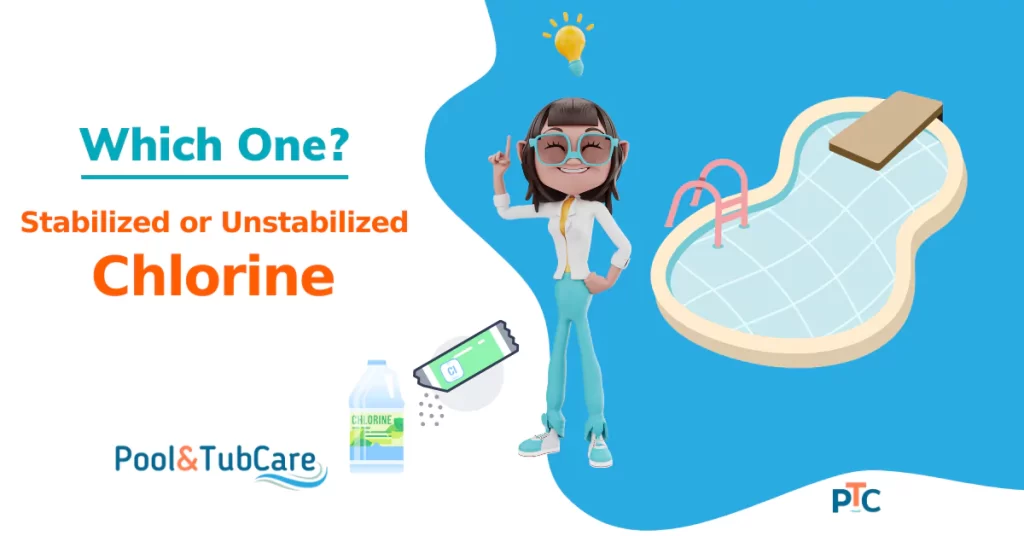All the pool owners know how vital chlorine is for their pools. Chlorine comes in liquid and granular forms.
A pool owner needs to decide which one to use based on the pool’s needs. Both have their advantages and disadvantages.
While liquid chlorine provides an easy option to handle, it is usually unstabilized and needs cyanuric acid. Liquid chlorine also causes a pH imbalance, requiring more chemicals for water chemistry balance. Granules(dichlor), however, don’t cause pH imbalance but are a little expensive and comparatively difficult to handle. Which one to use depends on your needs and preference.
In this article, I will go through the benefits of both so that you can decide which one suits your needs most.
How Chlorine Works
Before we go into details about liquid and granular chlorine, it is important to understand how chlorine works and what different forms of chlorine are in your pool.
Chlorine is a chemical generally in the form of (sodium hypochlorite or NaOCl) and is often referred to as “bleach”.
When you add sodium hypochlorite to water, it quickly dissociates and produces hypochlorous acid (HOCl).
Hypochlorous acid is a strong oxidizer, and it is this property that makes chlorine effective in killing bacteria and other microorganisms.
Related: Ideal chlorine levels for your pool!
Types of Chlorine
Chlorine is categorised in different types:
Free and Combined
Chlorine also exists in two forms, free chlorine and combined chlorine.
Free chlorine: It is the form of chlorine that is available to kill bacteria and other microorganisms. When you add chlorine to the pool, all the chlorine present in the pool should be in free chlorine form. When this chlorine binds with organic matter, it changes into other states.
Combined chlorine: This is the form of chlorine that is already used up and no longer available for sanitizing your pool. If the levels go combined chlorine goes high, then you need to shock your pool.
A simple test kit can measure the amount of free chlorine and total chlorine. The combined chlorine is the difference between total chlorine and free chlorine.
Total Chlorine = Free Chlorine + Combined Chlorine
Stabilized and Unstabilized
Stabilized chlorine: Stabilized chlorine contains cyanuric acid, also known as a stabilizer. Cyanuric acid protects chlorine from the sun.
Without cyanuric acid, the free chlorine is broken down by UV rays (aka sunlight) in a few minutes only. Without a stabilizer, you may lose almost all the free chlorine in a day full of sunshine.
Cyanuric acid extends the chlorine life in your pool by six or seven times.
Unstabilized chlorine: It does not contain cyanuric acid. Which means it is not effective in an outdoor pool. Unstabilized chlorine can be used only in indoor pools or spas.
Also, when shocking the pool, you can use unstabilized chlorine. It will be a good option for quick action as it can quickly eliminate a high load of organic waste.
Liquid Chlorine and Chlorine Granules
Now that we know the different types of chlorine let’s compare liquid chlorine and granular chlorine.
Liquid Chlorine:
It is made of around 10-15% chlorine and sodium. Liquid chlorine is synthesized by compressing the chlorine gas with caustic soda. This unstabilized chlorine works very fast as it is already dissolved.
It is best for commercial pools and can be best option to break the chlorine demand. There are a few advantages and disadvantages of using liquid chlorine.
Advantages of Liquid Chlorine
Easy to handle
Liquid chlorine is easy to use, and you can carry and store it conveniently. To use it, you need to pour it into the pool, and no need to mix it with water or any other chemicals. The main reason for its popularity is its refillability.
Gets dissolved quickly
Another advantage of liquid chlorine is that it gets dissolved quickly in the water as it is already in liquid form. You can use liquid chlorine to quick action on large organic waste.
Less expensive
Liquid chlorine is less expensive than granular chlorine. Price is generally 50% cheaper, but it may vary depending on the brand and quality.
Available in different concentrations
Liquid chlorine is available in different concentrations so that you can choose the one according to your pool’s needs.
Disadvantages of Liquid Chlorine
Unstable
Liquid chlorine is unstable and gets affected by the sun’s UV rays. Sunlight reduces its effectiveness, and it doesn’t last long in the pool. You need to add a stabilizer to increase its effectiveness.
Causes pH imbalance
Liquid chlorine has a pH of 13 and can cause a pH imbalance as it is a strong acid. This can make the water too alkaline, which is unsuitable for swimming. You need to add more chemicals to decrease the pH.
Short shelf life
Liquid chlorine has a short shelf life and loses half of its effectiveness over six to twelve months.
May Damage Pool Wall
It’s highly corrosive, and pockets of concentrated chlorine can lead to damage to walls.
Granular Chlorine:
Granular chlorine is made of around 60-70% chlorine and is also called powder chlorine. This chlorine works slowly as it first needs to get dissolved. This is the best and most popular option for private small pool owners, and it’s often more expensive than the liquid one. Here are a few advantages and disadvantages of using granular chlorine.
Chlorine granules generally come in dichlor, lithium hypo, and cal hypo.
Dichlor: Dichlor has around 60-65% chlorine and a pH of 7 and contains sodium. Its complete name is sodium dichloro-s-triazinetrioneas. It is quick-dissolving granular chlorine. You can use it to shock the pool as it works quickly.
Lithium hypochlorite: This chlorine is a fast-dissolving, easy-to-use powder. Lithium is lethal to microbes like algae hence has more sanitizing power. You can swim in the pool soon after using it. But, it is more expensive and difficult to find.
Cal hypo: Cal hypo is called Calcium hypochlorite and contains around 65-70% chlorine and calcium. This is the most popular option as it is the cheapest. It is also slow-dissolving chlorine and works slowly. Its pH is 12, which imbalances the pool chemistry, and you need to add other chemicals to lower the pH of pool water.
Advantages of Granular Chlorine
Stabilized
Granular chlorine is generally stabilized and isn’t affected by the sun’s UV rays, which helps it last longer in the pool.
pH balanced
Granular chlorine in dichlor form keeps the pH level of the pool water balanced as its pH is around 7. You don’t need to add more chemicals to balance the pH after using the chlorine granules.
Long shelf life
Granular chlorine has a long shelf life and doesn’t lose its effectiveness over time; you can store it for a long time.
Disadvantages of Granular Chlorine
Takes time to dissolve
As granular chlorine is solid in state, it takes some time to dissolve in water. You either need to dissolve it in water before mixing, or in a few cases, you can add it directly as per manufacturer instructions.
Corrosive
Granular chlorine is corrosive and can damage the pool’s lining and other parts made of metal.
Requires storage space
You need to have enough storage space to store granular chlorine.
Safety note: Whichever chlorine you decide to use, always use it with caution and handle it carefully. Chlorine fumes can be dangerous for health, and mixing different kinds of chlorine or other chemicals can lead to hazardous chemical reactions. Always read and follow the manufacturer’s instructions on the labels.
So Which One to Use, Liquid Chlorine or Granules
As we discussed, both forms, solid as well as liquid, do the same job of sanitizing your pool in the same way. They both contain chlorine, which works as a sanitizer in your pool.
What you want to use will depend on your pool size, frequency of use, bather load, and, most importantly, your preference.
If you have a large pool, using liquid chlorine might be more convenient and cheaper, while chlorine granules, specially dichlor, might work as an all-in-one solution for small pool owners.

